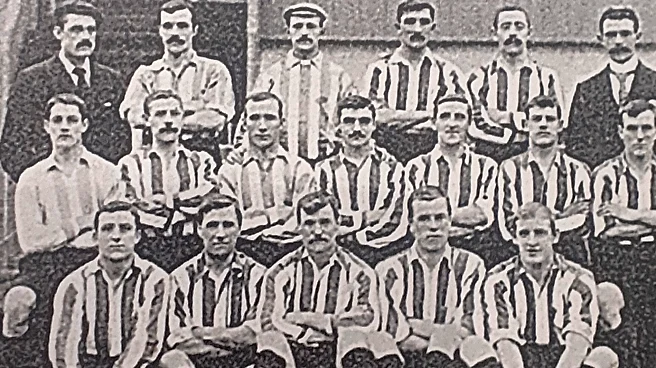It wasn’t until after World War I that Football League seasons would start commencing in August each year, as prior to that, it was customary for the new campaign to begin on the first Saturday of September.
This usually coincided with the end of the first-class cricket schedule, although due to the way the days fell, 1901 was to be slightly different and it was decided that the soccer would kick off on a Monday evening instead.
The transition between bat and ball to the beautiful game was always an intriguing
time for the sporting public and one that was usually greeted with great joy on Wearside, where football had now fully taken hold, although the Lads did inadvertently pay homage to the summer game when they hosted Sheffield United in their opener on this day.
Whilst not exactly ‘padded up’, title hopefuls Sunderland took to the pitch in white change shirts, meaning that Sheffield United could wear their traditional red and white stripes.
Although in cup competitions it was standard for the home team to switch when there was a colour clash, it seemed a little confusing given this was a league date, but with dark clouds above, the brighter tops might’ve actually aided the side, and the kits weren’t the only change!
During the offseason, the club had installed a new pitch drainage system, whilst the stands at Roker Park had also been spruced up and painted. Renovations had also continued outside the ground with the turnstile approaches — which had often become treacherous in slippery conditions — being made safer, and ‘The Corporation’ were in the process of constructing a new road ‘in the vicinity’ that would further improve access.
Although the infrastructure was getting better the weather, sadly, was not playing ball, with a chilly wind blowing and a strong hint of rain, but it was not enough to put the supporters off ahead of the big opener.
There were thought to be approximately 2,500 fans gathered around the barriers, and around 9,000 in total, by 17:30, and the numbers were to increase further once, as one local journalist put it, “The working man had had time to get a bite and a cup”.
It was unfortunate, therefore, that some of those would’ve presumably ended up missing the opening exchanges altogether, as it was agreed at short notice that due to concerns surrounding bad light, kick off would need to be brought forward.
The Blades got things moving at 17:38, yet Sunderland were quickly in possession and keen to make their mark. Goalkeeper Willie Foulke was grateful to see the ball trickle just wide after he was almost caught out by Alf Common and fumbled his shot, but he was beaten soon enough anyway, with Bobby Hogg getting the first goal of Sunderland’s season with a cross-shot that snuck in.
That was with less than ten minutes played, and it wasn’t long until Alex Mackie’s side seemed to have scored again, only for Common to be ruled offside.
The near-miss appeared to jolt United and after going close through Billy Beer, they levelled up courtesy of a clever Fred Priest strike.
With a tense midfield battle then ensuing, the scoreline remained at 1-1 for a period, during which Foulke and his counterpart Teddy Doig did still need to rush into action on occasion, and the crowd, by now numbering over 14,000, were appreciative of the level of effort on show.
The second half had commenced at 18:31, after which things were still tight. It was only in the final stages that Sunderland nudged themselves back ahead, and it took a quality set piece to break the deadlock, with Colin McLatchie’s beautifully struck corner being converted by Common.
McLatchie then helped wrap things up in the final minute when Common again turned in a flag kick of his, and the resulting victory felt all the more impressive when it became apparent afterwards that centre forward Jimmy Gemmell had suffered a nasty shoulder injury early on, yet still fought on through the pain.
A final attendance figure of 14,271 was subsequently confirmed too, with receipts totalling around £400 no doubt helping cover the costs of some of the recent stadium improvements.
Roker Park was certainly looking shipshape and ready for the season ahead, as was the team itself. Victory in the return match in October put the Black Cats top and having finished as runners-up in 1900/1901, they managed to go one better by the end of this campaign, winning a magnificent fourth Football League title.
Monday 2 September 1901
Football League Division One
Roker Park
Attendance: 14,271
Sunderland 3 (R Hogg 8’, Common 75’, 89’)
Sheffield United 1 (Priest 32’)
Sunderland: Doig, McCombie, Watson; Ferguson, McAllister, Jackson; Common, R Hogg*, Gemmell; Millar, McLatchie
*As well as Robert (Bobby) Hogg, William (Billy) Hogg was also in the squad. Billy replaced the injured Gemmell for the following match against Manchester City and scored the only goal of the game.
















